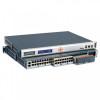Lantronix SLC 8000 Advanced Console Manager User Guide - Page 305
connect direct, deviceport, connect listen, set locallog clear, In the,
 |
View all Lantronix SLC 8000 Advanced Console Manager manuals
Add to My Manuals
Save this manual to your list of manuals |
Page 305 highlights
12: User Authentication KDC Port Use LDAP Custom Menu Escape Sequence Break Sequence Enable for Dial-back Dial-back Number Data Ports Listen Port Port on the KDC listening for requests. Enter an integer with a maximum value of 65535. The default is 88. Indicate whether Kerberos should rely on LDAP to look up user IDs and Group IDs. This setting is disabled by default. Note: Make sure to configure LDAP if you select this option. If custom menus have been created, you can assign a default custom menu to RADIUS users. A single character or a two-character sequence that causes the SLC 8000 advanced console manager to leave direct (interactive) mode. (To leave listen mode, press any key.) A suggested value is Esc+A (escape key, then uppercase "A" performed quickly but not simultaneously). You would specify this value as \x1bA, which is hexadecimal (\x) character 27 (1B) followed by an A. This setting allows the user to terminate the connect direct command on the command line interface when the endpoint of the command is deviceport, tcp, or udp. See Key Sequences on page 258 for notes on key sequence precedence and behavior. A series of 1-10 characters users can enter on the command line interface to send a break signal to the external device. A suggested value is Esc+B (escape key, then uppercase "B" performed quickly but not simultaneously). You would specify this value as \x1bB, which is hexadecimal (\x) character 27 (1B) followed by a B. Select to grant a user dial-back access. Users with dial-back access can dial into the SLC 8000 advanced console manager and enter their login and password. Once the SLC unit authenticates them, the modem hangs up and dials them back. Disabled by default. The phone number the modem dials back on depends on this setting for the device port. The user is either dialed back on a fixed number, or on a number that is associated with the user's login (specified here). The ports users are able to monitor and interact with using the connect direct command. U1 and U2 denote the USB upper and lower ports on the front of the SLC unit. The ports users are able to monitor using the connect listen command. Clear Port Buffers The ports whose port buffer users may clear using the set locallog clear command. 3. In the User Rights section, select the user group to which Kerberos users will belong. Group Select the group to which the Kerberos users will belong: Default Users: This group has only the most basic rights. You can specify additional rights for the individual user. Power Users: This group has the same rights as Default Users plus Web Access, Networking, Date/Time, Reboot & Shutdown, and Diagnostics & Reports. Administrators: This group has all possible rights. 4. Select or clear the checkboxes for the following rights: Full Administrative Networking Services Right to add, update, and delete all editable fields. Right to enter Network settings. Right to enable and disable system logging, SSH and Telnet logins, SNMP, and SMTP. SLC™ 8000 Advanced Console Manager User Guide 305















